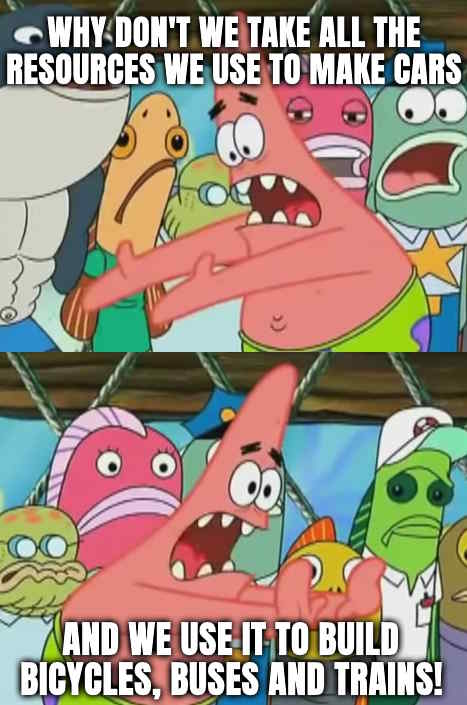Fuck Cars
A place to discuss problems of car centric infrastructure or how it hurts us all. Let's explore the bad world of Cars!
Rules
1. Be Civil
You may not agree on ideas, but please do not be needlessly rude or insulting to other people in this community.
2. No hate speech
Don't discriminate or disparage people on the basis of sex, gender, race, ethnicity, nationality, religion, or sexuality.
3. Don't harass people
Don't follow people you disagree with into multiple threads or into PMs to insult, disparage, or otherwise attack them. And certainly don't doxx any non-public figures.
4. Stay on topic
This community is about cars, their externalities in society, car-dependency, and solutions to these.
5. No reposts
Do not repost content that has already been posted in this community.
Moderator discretion will be used to judge reports with regard to the above rules.
Posting Guidelines
In the absence of a flair system on lemmy yet, let’s try to make it easier to scan through posts by type in here by using tags:
- [meta] for discussions/suggestions about this community itself
- [article] for news articles
- [blog] for any blog-style content
- [video] for video resources
- [academic] for academic studies and sources
- [discussion] for text post questions, rants, and/or discussions
- [meme] for memes
- [image] for any non-meme images
- [misc] for anything that doesn’t fall cleanly into any of the other categories
Recommended communities:
view the rest of the comments

Isn't the point of a 15 minute city that you can get anywhere within 15 minutes without a car?
(By the way, from a European standpoint it sounds really funny that 15 minute cities are not a reality for you. Like, why would you ever build a city differently in the first place?)
It's pretty disingenuous to claim that your city founded in 1300 has tight streets and isn't car-friendly because people in 1300 were really big on public transport.
And the answer is that cities grow descriptively rather than prescriptively. They generally add what is in demand/what they need piecemeal, and most US cities really grew in the 20th century.
That's why NYC, for example, has significantly better public transport than most of the nation - it's one of the oldest cities
This is also why moving to mass transit is a hard sell. It's expensive and there is less demonstrated need and more forethought behind the switchover.
Not to mention that the US has far, far more land than Europe. It's hard for many to imagine having to drive 3 hours just to get to a major city.
There’s an few distinctions about American culture as it relates to car culture.
America had/has a lot of land
Much of this is/was vastly underdeveloped right outside of urban hubs, unlike Europe/related which benefits from a tighter interconnected network of cities that more immediately benefit from mass transit systems
In the US post-WWII middle class and privileged were often sold an idea of peaceful suburban lifestyles away from urbanized areas
Car manufacturers marketed this successfully as a way to encourage families away from city life and thus build a more solid reliance on their vehicles
City planning was therefore often built around a suburban-city sprawl rather than a cohesive urban community designed around efficiency
Exactly. Unfortunately, in Australia, we tend to borrow stupid ideas from the US to make money and have sprawling suburbs with zero amenity.
For instance, we had a new suburbian development within 20km from the CBD with the promise of schools, community centres etc. in the early 2000s. When all the houses were bought and built, suddenly there's no money for amenities so they just sold the land to developers who then put more houses in. Now the only way to get anything you need is by car because there's no train or buses because it was supposed to be accessible by bike/walking but now isn't. And not to mention gridlock of vehicles looking to get out of the suburbs for food etc. out of the one intersection provided.
I would love 15min cities without cars for my country but the attitude to cars here is similar to the attitude about guns in the US.